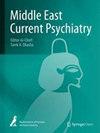Positive thinking, resourcefulness skills, and future anxiety among the caregivers of children with intellectual disability: an intervention study
IF 1.6
Q3 PSYCHIATRY
引用次数: 0
Abstract
Positive thinking is a mental attitude that focuses on positive thoughts and beliefs in order to improve one’s outlook on life and is linked to a variety of positive psychological and health consequences, as well as decreased anxiety and depression. This study aimed to evaluate the effect of an intervention program on positive thinking, resourcefulness skills, and future anxiety among caregivers of children with intellectual disability. A quasi-experimental design was used on 70 caregivers whose children were attending the intellectual education school in Zagazig City. Data were collected through an interview questionnaire sheet composed of sociodemographic datasheet and child characteristics, the Positive Thinking Skills Scale (PTSS), the Resourcefulness Skills Scale (RSS), and the Future Anxiety Scale. The mean score of future anxiety was lower at the post-intervention phase compared to pre-intervention among the participants’ caregivers. Otherwise, the mean scores of positive thinking, social resourcefulness, personal resourcefulness, and total resourcefulness were higher at the post-intervention phase compared to pre-intervention among the participants’ caregivers. Positive thinking improved among 60.76%, resourcefulness skills among 19.49%, and future anxiety decreased among 21.30% of the caregivers after the intervention. The intervention program was efficient in improving the caregivers’ positive thinking and resourcefulness skills and decreasing their future anxiety. A continuous psychosocial training program is recommended to enhance the caregivers’ positive thinking and improve other aspects of psychological adjustment.智障儿童照顾者的积极思维、机智技能和未来焦虑:一项干预研究
积极思考是一种注重积极想法和信念以改善人生观的心理态度,与各种积极的心理和健康后果以及减少焦虑和抑郁有关。本研究旨在评估一项干预计划对智障儿童照顾者的积极思维、足智多谋技能和未来焦虑的影响。研究采用准实验设计,对象为 70 名子女在萨加齐格市智力教育学校就读的照顾者。数据是通过由社会人口数据表和儿童特征、积极思维能力量表(PTSS)、资源能力量表(RSS)和未来焦虑量表组成的访谈问卷收集的。与干预前相比,干预后阶段参与者照顾者的未来焦虑平均得分较低。此外,与干预前相比,干预后阶段参与者的照顾者在积极思考、社会足智多谋、个人足智多谋和总足智多谋方面的平均得分均有所提高。干预后,60.76%的照顾者的积极思考能力有所提高,19.49%的照顾者的足智多谋能力有所提高,21.30%的照顾者的未来焦虑有所降低。干预计划有效提高了照顾者的积极思维和机智技能,并降低了他们的未来焦虑。建议持续开展社会心理培训计划,以提高照顾者的积极思维能力,并改善其心理适应的其他方面。
本文章由计算机程序翻译,如有差异,请以英文原文为准。
求助全文
约1分钟内获得全文
求助全文
来源期刊

Middle East Current Psychiatry
Medicine-Psychiatry and Mental Health
CiteScore
3.00
自引率
0.00%
发文量
89
审稿时长
9 weeks
 求助内容:
求助内容: 应助结果提醒方式:
应助结果提醒方式:


